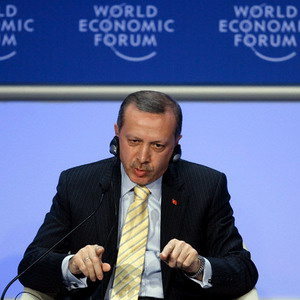Erdogan and Politics in Public Sphere

Erdogan’s walkout in Davos to protest Simon Peres’ statements can be viewed from different perspectives. The one adopted in this article is rational act, realpolitik and the importance of public opinion.
At the surface, it seems that Erdogan’s move is at odds with the "cost-benefit" principle, rational acts and realpolitik. But aren’t there any other interests for Turkey and Erdogan (defending human rights in general, and the rights and Palestinians specifically) to fulfill.
According to scholars like Hans Morgenta, ’interest’ is the main guide of realpolitik in international sphere. He believes that this notion allows us to evaluate foreign policies of different countries regardless of motives, priorities and personal characteristics of their statesmen. ’Interests’ according to Morgenta is an objective notion that is not influenced by temporal or spatial circumstances. That’s how he considers those states as rational actors which pursue their interests.
But scholars like the constructivist Alexander Wendt view the concepts of interests and rational act from a different perspective. According to Wendt, identity is the precondition to interests. Actors don’t know what they want as long as they don’t know who they are. And corresponding to identities which carry different loads of cultural meanings, interests have shades and grades. Identities may be chosen based on interests (as some rationalists say). But even these interests imply deeper identities. Wendt also believes that cognitive and reflective factors have effects on forming ’interests’. Interests are themselves cognitions or models. Also, he believes in the importance of reflection in collective decisions especially in international politics. Reflection, according to Wendt, is a process of discussion, persuasion and categorization. It seems that the rational act theory can not be the only theory applied in different situations. The discussion and persuasion process in the ’public sphere’ has an impact on adopting approaches which may not at times appear rational.
From this perspective, Erdogan’s surprising –albeit admirable- reaction to Peres’ statements and the consequent walkout, though demonstrating ideological motives and preferences of the Turkish PM, has also origins in his ’identity’ and ’models’. Erdogan knows "who he is". In addition, his protest is the reflection of a process, one formed by public opinion around the world in response to inhumane treatment of civilians in Gaza. A great number of ’public spheres’ have denounced Tel Aviv’s atrocious behavior.
That is how Erdogan puts aside the cost-benefit factor -which is rooted in a rational act and realpolitik perspective- and behaves such that he is welcomed not only in Turkey, but in many other parts of the world. Media repercussions are the best proof for this claim.

